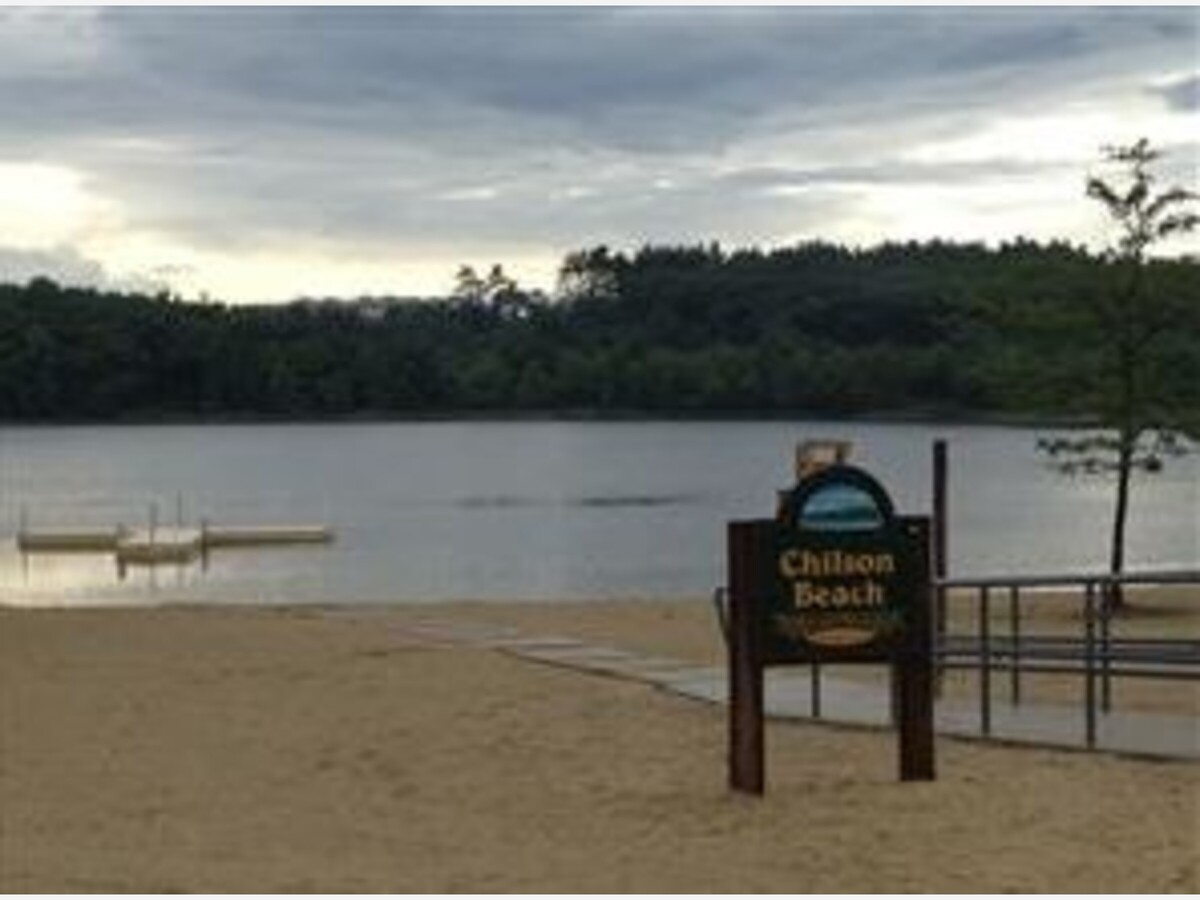Image

Above, Franklin's Chilson Beach closed Tuesday for "bacterial exceedance" according to the Massachusetts Department of Public Health dashboard.
Yesterday, the Massachusetts Department of Public Health (DPH) announced a second confirmed case of Eastern equine encephalitis (EEE) in a human and a second confirmed case in a horse this year. The human case is a woman in her 30s. Both were exposed in the area of Plymouth County that was aerial sprayed Tuesday night and both became infected before spraying was done this week.
Add that concern to frisky sharks, wind turbine debris on beaches, ticks, West Nile virus, and bacteria levels that closed, at peak, more than 80 of the beaches monitored by the state, currently including one in Franklin.
According to the state, there are no risk level changes associated with the latest EEE findings, and the impacted communities are at least a few towns away from Franklin and Medway.
There have been 76 EEE-positive mosquito samples so far this year detected from Abington, Carver, Halifax, Kingston, Marion, Middleborough, Plymouth, Rochester, Wareham, and Whitman in Plymouth County; Bedford, Raynham, Taunton, and Westport in Bristol County; Barnstable in Barnstable County; Dedham and Medfield in Norfolk County; Sudbury in Middlesex County; Amesbury and Haverhill in Essex County; and Dudley and Upton in Worcester County.
“This evidence of the spread of EEE to a person and a horse in Plymouth County before aerial spraying confirms risk in the area,” said Public Health Commissioner Robbie Goldstein, MD, PhD. “We expect that the aerial spraying will help prevent risk for EEE from continuing to escalate in the area, but it does not eliminate it completely. We are asking people to be consistent about taking steps to prevent mosquito bites.”
EEE is a rare but serious and potentially fatal disease that can affect people of all ages. EEE is generally spread to humans through the bite of an infected mosquito. The first human infection with EEE virus this year was a male in his 80s exposed in southern Worcester County.
“EEE risk does not end on Labor Day,” said State Epidemiologist Dr. Catherine M. Brown. “People should continue to use a mosquito repellent with an EPA-registered active ingredient any time they are outdoors. As the weather gets cooler it will be easier to wear long sleeves and pants to reduce exposed skin. We continue to strongly advise that individuals in areas where EEE risk is at high and critical levels reschedule evening outdoor events to avoid peak mosquito biting hours.”
About a week ago, the Massachusetts Department of Public Health (DPH) announced that due to ongoing evidence of mosquitoes carrying West Nile virus (WNV), eight municipalities are now considered to be at high risk from the virus. This elevated risk level applies to Boston in Suffolk County and Abington, Brockton, East Bridgewater, Marion, Mattapoisett, Rochester, and Whitman in Plymouth County.
The first WNV-positive mosquitoes in Massachusetts this year were announced on July 2 from Quincy.
A total of 69 beaches in Massachusetts were closed for swimming as of Tuesday, including Franklin's Chilson Beach, mostly due to high bacteria levels, according to the latest numbers from the state's Department of Public Health.
In the months since the state's Department of Conservation and Recreation opened 81 freshwater and saltwater beaches for the season, the number of beaches closed has gone up and down. For the most part at the beginning, no more than around 20 beaches were closed at a time due to high bacteria. But the number soared as the summer went on, reaching the previous season-high total of 88, a week ago Thursday. The list as of Tuesday includes:
Amherst, MA
Puffers Pond (AKA Factory Hollow Pond)
Stanley Street swimming hole at Cushman Bridge
Ashby, MA
Damon Pond Beach
Ashland, MA
Ashland Reservoir-Main Beach
Beverly, MA
Mingo
Obear Park
Woodbury
Boston, MA
Savin Hill
Braintree, MA
Smith Beach
Clarksburg, MA
Mauserts Pond
Danvers, MA
Sandy Beach
Dover, MA
Grossman Beach
Framingham, MA
Learned Pond Beach
Franklin, MA
Chilson Beach
Gloucester, MA
Half Moon
Plum Cove
Holland, MA
Collette Drive Beach
Hull, MA
Darcy's
Kingston, MA
Rocky Nook
Lowell, MA
Merrimack River- Bath House
Lynn, MA
Kings
Manchester, MA
Magnolia
West Manchester
Nahant, MA
Nahant Beach
Nantucket, MA
Washing Pond
Natick, MA
Cochituate State Park Beach (also closed due to harmful cyanobacteria bloom)
North Andover, MA
Stevens Pond - Center
Northampton, MA
Musante Beach
Quincy, MA
Germantown Firestation
Revere, MA
Revere
Short
Salem, MA
Children's Island - Back
Forest River - Point
Ocean Avenue
Osgood
Steps
Willow Avenue
Saugus, MA
Pearce Lake at Breakheart Reservation
Scituate, MA
Scituate Lighthouse
Shutesbury, MA
Lake Wyola
Southwick, MA
South Pond Beach
Swampscott, MA
Kings
Swansea, MA
Cedar Cove Club
Leeside
Templeton, MA
Beamans Pond-Campground
Beamans Pond-Day Use
Townsend, MA
Pearl Hill Pond Beach
Wareham, MA
Indian Mound Beach
West Stockbridge, MA
Card Pond Beach
West Tisbury, MA
Seth's Pond
Westwood, MA
North Beach (Westwood)
Summer Beach
Winchendon, MA
Lake Dennison State Park
Winchester, MA
Shannon Beach at Upper Mystic
Winthrop, MA
Winthrop Beach
Worcester, MA
Lake Quinsigamond-Regatta Point Beach
The following beaches are closed for swimming due to harmful cyanobacteria bloom:
Barnstable, MA
Wequaquet Lake Town
Wequaquet Lake Yacht Club
Framingham, MA
Waushakum Beach
Oxford, MA
Carbuncle Pond
Springfield, MA
Bass Pond
Wayland, MA
Wayland Town Beach
Westborough, MA
Lake Chauncy Beach
Worcester, MA
Indian Lake Public Beach (Sherburne Ave)
Shore Park
These beaches are closed for a reason not listed:
Concord, MA
Walden Pond - Red Cross
Grafton, MA
Silver Lake Beach
Salem, MA
Camp Naumkeag
Truro, MA
Longnook